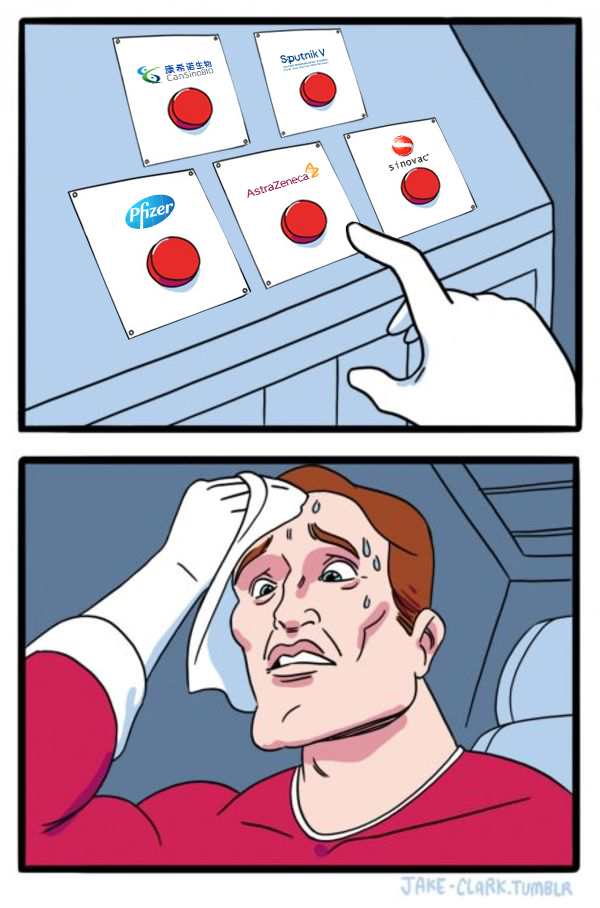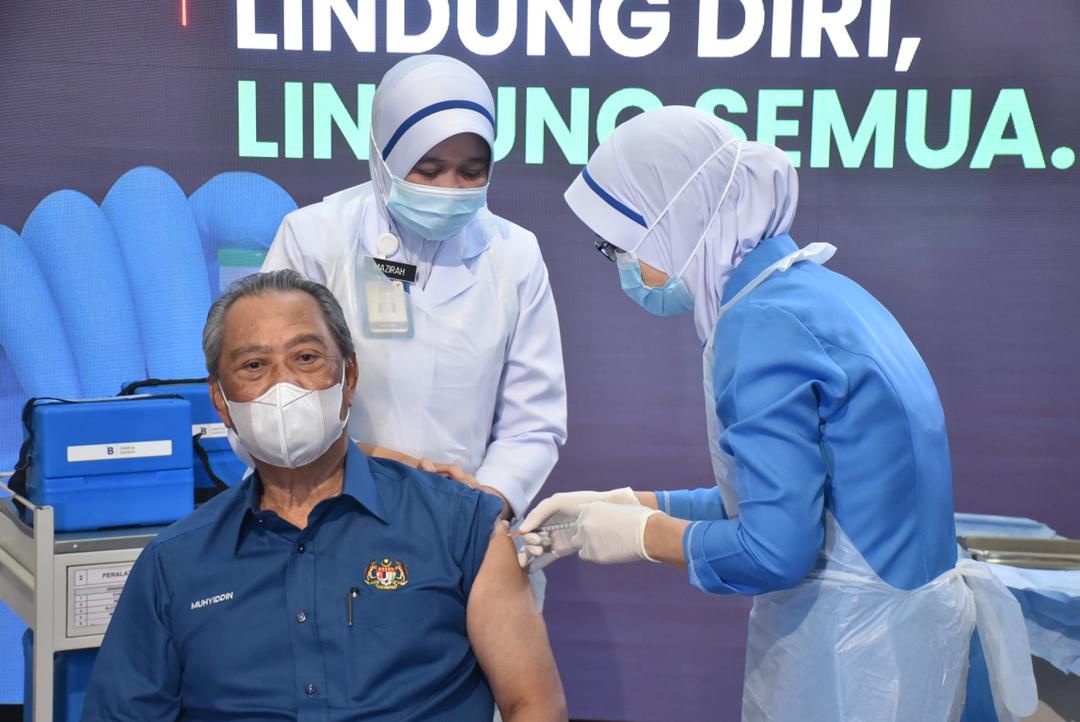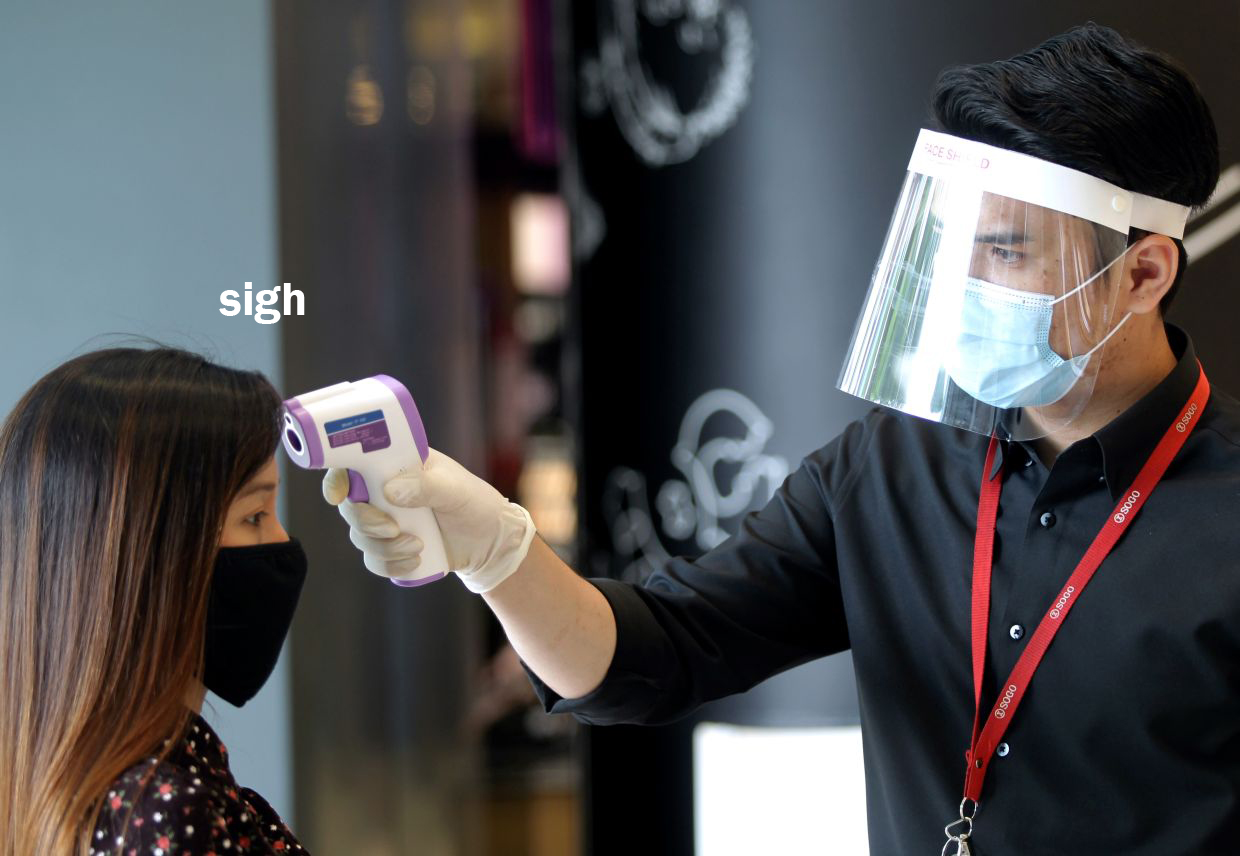Malaysia will use more than one type of vaccine. Does it matter which one we get?

- 428Shares
- Facebook387
- Twitter8
- LinkedIn7
- Email6
- WhatsApp20
If you’re reading this, good job! You’ve made it through a year of movement control orders, your lifestyle and career probably got turned upside down, and you’re probably tired from constantly worrying about the future. Despite all that crap you’ve went through, you’re still here, and we’re proud of you for that. Here, have a cute panda gif for your troubles:

Now that the vaccines are here, the past year suddenly feels like it went by in a flash, dunnit? Seems like it was just yesterday that people were fighting over toilet paper at Tesco, but now even Tesco has a different name already. We remembered thinking that it would take years for the vaccines to arrive, but because so much research, funding and volunteers went into their development, there are now 12 vaccines for Covid-19 approved internationally, and 57 more coming soon.
Now all that’s left is to vaccinate everyone, which would be no small task. To the government’s credit, they seem to have most of the process figured out, as evident in the guidebook and website they published for the vaccination program. But if you have been skimming news about the vaccine like we have, you might be surprised to go through the guide and learn that…
You might get one of several different types of Covid-19 vaccine

As we’ve said earlier, as of the time of writing there are already 12 vaccines that have been approved and in use in several countries. Based on the guidebook, Malaysia will be using 5 of them:
- Comirnaty, developed by Pfizer (US) and BioNTech (Germany),
- Astrazeneca/Covishield, developed by Oxford University (UK) and Vaccitech,
- CoronaVac, developed by Sinovac (China),
- Convidicea, developed by CanSino Biologics (China), and
- Sputnik V, developed by Gamaleya Research Institute (Russia) and Acellena.
Besides these five, there are talks about using more vaccine types in the future as well. Wah, why so many types? Can’t we just pick the best one and stick with it? Well, we can, but it’ll probably take longer for everyone to get vaccinated. Right now, the whole world is scrambling for vaccines, and the few companies that make them can’t magically make billions of doses of vaccines appear overnight.
So the strategy here is to strike as many deals for legit vaccines as we can to get enough for everyone. The goal is to achieve herd immunity as soon as possible, which is when so many people are immune to the virus that it can’t get around easily. To do that, we need to vaccinate at least 80% of the Malaysian population, which would be roughly 26.2 million people.
“We can’t afford to obtain vaccines from a single source — no company has the ability to provide enough doses for everyone within an appropriate time frame. In fact, waiting will further impair our ability to reach herd immunity,” – Dr Helmy Haja Mydin, respiratory specialist, as reported by Malay Mail.
Of the 5 kinds of vaccine listed, Pfizer’s Comirnaty is planned to be enough for 50% of the population, while the other four kinds of vaccine will support another 59.65%. As of now, only the Pfizer vaccine had been locally approved for use in Malaysia, with the rest probably getting approved soon.

So right now, at least on paper, we have more than enough vaccines for everyone. But you might have put two and two together and realized that we may be getting different kinds of vaccines, so you might be wondering…
Does it matter which kind of vaccine I get?

The 5 vaccines are different in several ways, but for the consumer, you might be concerned with what kind of vaccines they are and their efficacy levels. Although they are categorized as either mRNA, inactivated, or non-replicating viral vector, in essence, all five vaccines work the same way: they show your immune system what to look out for in Covid-19 (the antigens), so that your immune system can practice fighting it (aka making antibodies after an immune response).
The difference is how they’re doing that. Inactivated vaccines, like the CoronaVac, are probably the most familiar. These consist of dead viruses (or pieces of them), so think of them as training dummies your immune system can practice on. The other two types are a wee bit more complicated, but they essentially carry only the information about the Covid-19 antigen, rather than the actual viruses.
In non-replicating viral vector vaccines, like Astrazeneca, Convidicea, and Sputnik V, that information is carried into your body using common viruses (like adenoviruses) that have been modified to be harmless and to carry information on Covid-19’s antigen within them instead of their own. In contrast, the relatively newer mRNA vaccines, like Pfizer’s Comirnaty, use something called messenger RNAs to carry that antigen information. Your immune cells will then use that information to grow only the Covid-19 antigens and trigger an immune response.

The efficacy level is pretty straightforward. So far, Pfizer’s Comirnaty has the highest efficacy level at 95%, which means that it works in 95% of the people they tested it on in lab settings. Others vary in effectiveness, with the CoronaVac vaccine having an efficacy level of between 50.4-91.25%.
With that in mind, it seems a bit concerning that some of us might get vaccines with lower efficacy levels or those using older/newer technologies, but with the current situation, it’s not like we have much choice. On the bright side, though, all of these vaccines have been tested and found to work to some degree, and those approved for our use would have been subjected to strict vetting on our side as well, so it probably won’t matter which one you get. After all, getting a 50% protection is better than getting no protection at all.
“If you did have a choice, I think I would probably still go with the ones that are showing 95 percent efficacy, but I would certainly be happy to have the other adenoviral-based vaccine if that was what was available to me. I wouldn’t skip getting a vaccine because the Moderna or the Pfizer vaccines weren’t available.” – Susan Kaech, professor and director of the NOMIS Center for Immunobiology and Microbial Pathogenesis, to Popular Science.
With the first batch of the Pfizer vaccines already here, and more on the way, it may feel like we’re getting really close to the end credits of this corona drama. Still, we have to remember that…
Even with vaccines, we still have to be careful for a while longer

While it’s reassuring to know that the government is able to get enough vaccines for Malaysia (at least on paper), it’s still too early to take off our masks and book flights for balik kampung. For one thing, vaccinating everyone is a huge task that requires a huge amount of logistics, so it’ll still be some time before we can achieve herd immunity. According to the government’s guide, there will be three phases to the rollout:
- Phase 1, between February and April, will see 500,000 frontliners (including non-medical frontliners like welfare officers and politicians) vaccinated.
- Phase 2, between April and August, will see the rest of the frontliners as well as people in high-risk groups vaccinated, targeting 9.4 million people.
- Phase 3, starting May and stretching over to February next year, will see the rest of us (both Malaysians and foreigners) who’re over 18 vaccinated, targeting more than 13.7 million people.
So even if everything goes according to plan, we still have to be careful for possibly another year. But it probably won’t be as bad as the past year. While it’s still unclear whether we can achieve herd immunity with vaccines – they can stop people from falling sick, but we dunno yet if they can stop people from carrying the virus and infecting other people – we can at least reduce the number of deaths and hospitalizations with them, so getting infected with Covid-19 won’t be such a big deal to vaccinated people in the future.
For now, it seems that vaccinations won’t be made mandatory, although that might change soon. Regardless, you can now register for it already, so if you haven’t done it yet, consider doing so: it’s free! For more information on the whole process, you can check out the vaccination guidebook here.
- 428Shares
- Facebook387
- Twitter8
- LinkedIn7
- Email6
- WhatsApp20
